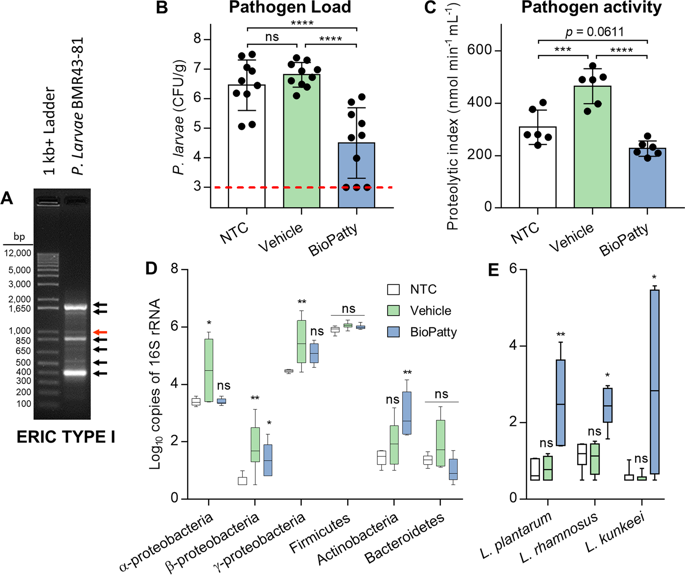Our official English website, www.x-mol.net, welcomes your feedback! (Note: you will need to create a separate account there.)
Novel probiotic approach to counter Paenibacillus larvae infection in honey bees.
The ISME Journal ( IF 11.0 ) Pub Date : 2019-10-29 , DOI: 10.1038/s41396-019-0541-6 Brendan A Daisley 1, 2 , Andrew P Pitek 3 , John A Chmiel 1, 2 , Kait F Al 1, 2 , Anna M Chernyshova 3 , Kyrillos M Faragalla 3 , Jeremy P Burton 1, 2, 4 , Graham J Thompson 3 , Gregor Reid 1, 2, 4
The ISME Journal ( IF 11.0 ) Pub Date : 2019-10-29 , DOI: 10.1038/s41396-019-0541-6 Brendan A Daisley 1, 2 , Andrew P Pitek 3 , John A Chmiel 1, 2 , Kait F Al 1, 2 , Anna M Chernyshova 3 , Kyrillos M Faragalla 3 , Jeremy P Burton 1, 2, 4 , Graham J Thompson 3 , Gregor Reid 1, 2, 4
Affiliation

|
American foulbrood (AFB) is a highly virulent disease afflicting honey bees (Apis mellifera). The causative organism, Paenibacillus larvae, attacks honey bee brood and renders entire hives dysfunctional during active disease states, but more commonly resides in hives asymptomatically as inactive spores that elude even vigilant beekeepers. The mechanism of this pathogenic transition is not fully understood, and no cure exists for AFB. Here, we evaluated how hive supplementation with probiotic lactobacilli (delivered through a nutrient patty; BioPatty) affected colony resistance towards a naturally occurring AFB outbreak. Results demonstrated a significantly lower pathogen load and proteolytic activity of honey bee larvae from BioPatty-treated hives. Interestingly, a distinctive shift in the microbiota composition of adult nurse bees occurred irrespective of treatment group during the monitoring period, but only vehicle-supplemented nurse bees exhibited higher P. larvae loads. In vitro experiments utilizing laboratory-reared honey bee larvae showed Lactobacillus plantarum Lp39, Lactobacillus rhamnosus GR-1, and Lactobacillus kunkeei BR-1 (contained in the BioPatty) could reduce pathogen load, upregulate expression of key immune genes, and improve survival during P. larvae infection. These findings suggest the usage of a lactobacilli-containing hive supplement, which is practical and affordable for beekeepers, may be effective for reducing enzootic pathogen-related hive losses.
中文翻译:

对抗蜜蜂类芽孢杆菌幼虫感染的新型益生菌方法。
美国臭虫 (AFB) 是一种影响蜜蜂 (Apis mellifera) 的剧毒疾病。致病生物,类芽孢杆菌幼虫,在疾病活跃状态下攻击蜜蜂巢并导致整个蜂巢功能失调,但更常见的是无症状地存在于蜂巢中,作为不活跃的孢子,即使是警惕的养蜂人也无法幸免。这种致病转变的机制尚不完全清楚,也没有治愈 AFB 的方法。在这里,我们评估了蜂巢补充益生菌乳酸杆菌(通过营养饼提供;BioPatty)如何影响菌落对自然发生的 AFB 爆发的抵抗力。结果表明,来自 BioPatty 处理的蜂巢的蜜蜂幼虫的病原体负荷和蛋白水解活性显着降低。有趣的是,在监测期间,无论治疗组如何,成年护士蜜蜂的微生物群组成都发生了明显的变化,但只有载体补充的护士蜜蜂表现出较高的 P. 幼虫负荷。利用实验室饲养的蜜蜂幼虫进行的体外实验表明,植物乳杆菌 Lp39、鼠李糖乳杆菌 GR-1 和昆基乳杆菌 BR-1(包含在 BioPatty 中)可以减少病原体负荷,上调关键免疫基因的表达,并提高 P 期间的存活率. 幼虫感染。这些发现表明,使用含乳酸杆菌的蜂巢补充剂对养蜂人来说是实用且负担得起的,可能有效减少与地方性病原体相关的蜂巢损失。利用实验室饲养的蜜蜂幼虫进行的体外实验表明,植物乳杆菌 Lp39、鼠李糖乳杆菌 GR-1 和昆基乳杆菌 BR-1(包含在 BioPatty 中)可以减少病原体负荷,上调关键免疫基因的表达,并提高 P 期间的存活率. 幼虫感染。这些发现表明,使用含乳酸杆菌的蜂巢补充剂对养蜂人来说是实用且负担得起的,可能有效减少与地方性病原体相关的蜂巢损失。利用实验室饲养的蜜蜂幼虫进行的体外实验表明,植物乳杆菌 Lp39、鼠李糖乳杆菌 GR-1 和昆基乳杆菌 BR-1(包含在 BioPatty 中)可以减少病原体负荷,上调关键免疫基因的表达,并提高 P 期间的存活率. 幼虫感染。这些发现表明,使用含乳酸杆菌的蜂巢补充剂对养蜂人来说是实用且负担得起的,可能有效减少与地方性病原体相关的蜂巢损失。
更新日期:2020-01-17
中文翻译:

对抗蜜蜂类芽孢杆菌幼虫感染的新型益生菌方法。
美国臭虫 (AFB) 是一种影响蜜蜂 (Apis mellifera) 的剧毒疾病。致病生物,类芽孢杆菌幼虫,在疾病活跃状态下攻击蜜蜂巢并导致整个蜂巢功能失调,但更常见的是无症状地存在于蜂巢中,作为不活跃的孢子,即使是警惕的养蜂人也无法幸免。这种致病转变的机制尚不完全清楚,也没有治愈 AFB 的方法。在这里,我们评估了蜂巢补充益生菌乳酸杆菌(通过营养饼提供;BioPatty)如何影响菌落对自然发生的 AFB 爆发的抵抗力。结果表明,来自 BioPatty 处理的蜂巢的蜜蜂幼虫的病原体负荷和蛋白水解活性显着降低。有趣的是,在监测期间,无论治疗组如何,成年护士蜜蜂的微生物群组成都发生了明显的变化,但只有载体补充的护士蜜蜂表现出较高的 P. 幼虫负荷。利用实验室饲养的蜜蜂幼虫进行的体外实验表明,植物乳杆菌 Lp39、鼠李糖乳杆菌 GR-1 和昆基乳杆菌 BR-1(包含在 BioPatty 中)可以减少病原体负荷,上调关键免疫基因的表达,并提高 P 期间的存活率. 幼虫感染。这些发现表明,使用含乳酸杆菌的蜂巢补充剂对养蜂人来说是实用且负担得起的,可能有效减少与地方性病原体相关的蜂巢损失。利用实验室饲养的蜜蜂幼虫进行的体外实验表明,植物乳杆菌 Lp39、鼠李糖乳杆菌 GR-1 和昆基乳杆菌 BR-1(包含在 BioPatty 中)可以减少病原体负荷,上调关键免疫基因的表达,并提高 P 期间的存活率. 幼虫感染。这些发现表明,使用含乳酸杆菌的蜂巢补充剂对养蜂人来说是实用且负担得起的,可能有效减少与地方性病原体相关的蜂巢损失。利用实验室饲养的蜜蜂幼虫进行的体外实验表明,植物乳杆菌 Lp39、鼠李糖乳杆菌 GR-1 和昆基乳杆菌 BR-1(包含在 BioPatty 中)可以减少病原体负荷,上调关键免疫基因的表达,并提高 P 期间的存活率. 幼虫感染。这些发现表明,使用含乳酸杆菌的蜂巢补充剂对养蜂人来说是实用且负担得起的,可能有效减少与地方性病原体相关的蜂巢损失。



























 京公网安备 11010802027423号
京公网安备 11010802027423号